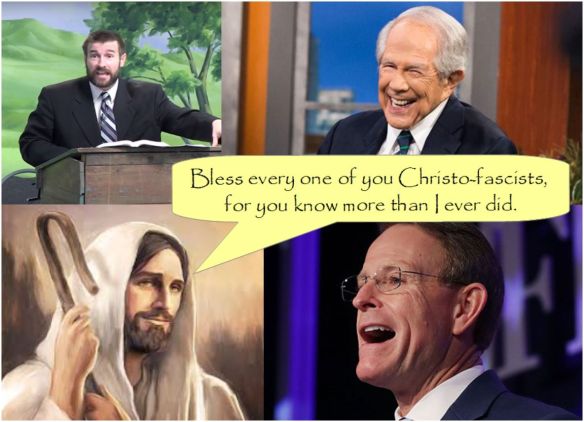
A few days ago, notorious God-botherer and TV evangelist, Pat Robertson, said on his TV Show that churches should revise Jesus’ stern teaching about divorce to better fit modern sensibilities. As today’s Christians divorce at about the same rate as non-believers, old Pat thinks it a mite inconvenient that they should feel guilty about it. He reminded his viewers that Jesus gave the church authority over all things and that it should therefore amend Jesus’ teaching. That’s amend as in ‘ignore completely’.
Which is fine, I guess, if you take the same approach to everything else Jesus said. That way, Christians would be safe to ‘amend’ his commands about feeding the hungry, visiting the imprisoned, healing the sick, turning the other cheek, welcoming the stranger, going the extra mile, forsaking possessions, relinquishing wealth, giving to everyone who asks, not judging, putting themselves last and others first, loving their neighbour and enemies alike… and so on.
But wait – they do that already, don’t they? Most Christians don’t practise these things. They don’t see these commands as applicable to them. They work hard, and unconvincingly, at interpreting his words as metaphorical – ‘he didn’t really mean give everything away because where would that leave us?’ – or claim they’re being taken out of context, or insisting they have a spiritual meaning…
Which is to say, nothing Jesus said is to be taken literally, even though the most straight forward reading of his pronouncements is that this is how he meant them. It’s how his early followers, the people who preserved or created his words in the gospels, understood them. Why record them otherwise?
But Jesus’ moralising is inconvenient, impractical, exacting, extreme; ridiculous, in fact, and Christians know this. Still his commands must be dealt with somehow. So the Righteous™ work round them – like Robertson and the teaching about divorce – or they ignore them completely and replace his priorities with ones of their own: worshipping him; defending his reputation; striving for power; complaining about secular society; promoting aggression; acquiring wealth; trying to control others’ behaviour; interfering in others’ sex lives; suppressing LGBT people; arguing that religious rights trump those of minorities; opposing abortion.
None of these figured on Jesus’ agenda. Some are in direct opposition to what he’s made to say in the gospels.
When we see Christians doing the things Jesus tells them they should be doing, maybe then we’ll listen to what they have to say. When they demonstrate credibility rather than hypocrisy, maybe they’ll have earned the right to be heard. But as there’s not much chance of that happening any time soon, it’s way past time we ignored them, and their superstition, in much the same way they ignore their Lord and Saviour™.
*See my book of the same name: https://www.amazon.com/gp/product/147016373X/ref=dbs_a_def_rwt_hsch_vapi_taft_p1_i0 (US) & https://www.amazon.co.uk/gp/product/147016373X/ref=dbs_a_def_rwt_hsch_vapi_taft_p1_i0 (UK)


